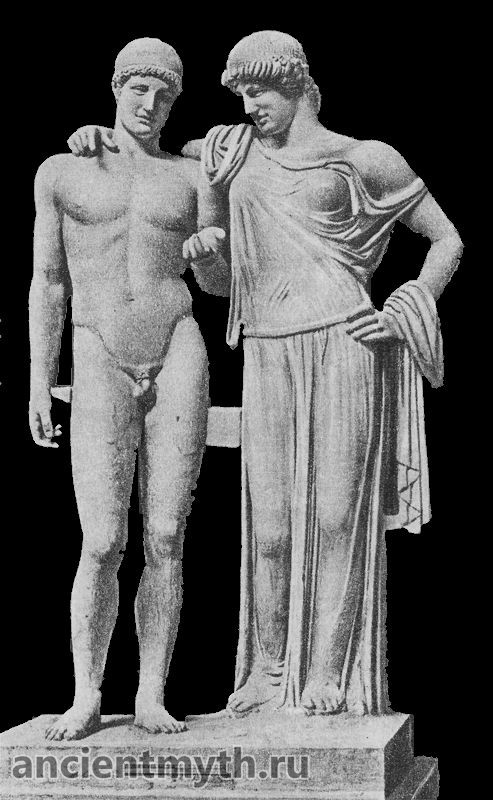Agamemnon and his son Orestes. The death of Agamemnon.
Agamemnon, going on a campaign near Troy, promised his wife Clytemnestra to let her know immediately when Troy falls and the bloody war is over. The servants sent by him had to build bonfires on the tops of the mountains. Such a signal, transmitted from one mountain peak to another, could soon reach his palace, and Clytemnestra would have learned about the fall of the great Troy before others.

(Sculpture group of the V century BC)
It was a dark night. The east has already begun to pale a little. Morning was approaching. Suddenly a slave saw a bright fire on a distant mountaintop. It was a long-awaited signal.
The great Troy has fallen; Agamemnon will return home soon. The slave rejoiced - now his painful night watch is over. He hurried to Clytemnestra and told her the good news. But was she joyful for Clytemnestra?
In order not to cast a shadow of suspicion on her, Clytemnestra pretended that she was glad to hear the news, and, having called the slaves, went to offer a thanksgiving sacrifice to the gods. In the depths of her heart, the insidious Clytemnestra plotted the death of Agamemnon.
The residents of the city also gathered at the palace of Agamemnon. The news quickly reached them that the great Troy had finally fallen.
The elders wanted to meet Agamemnon at the court, although they sometimes doubted that their king would really return soon. These doubts were dispelled by the arrival of a messenger; he announced that Agamemnon was not far away. Clytemnestra pretended to be delighted again. She hurried to the palace as if to prepare everything for the meeting, but she was not preparing for the meeting of her husband, but for his murder. Finally, Agamemnon himself appeared in the distance on a chariot at the head of his victorious army. Decorated with flowers and greenery, the warriors marched, and behind them they carried countless loot and many captives. A sad daughter sat next to the king on a chariot Priama, broadcasting Cassandra. The people of the tsar met with loud shouts. Clytemnestra also came out to meet him. She ordered to cover the whole way to the palace with purple fabrics. Like a god, she met Agamemnon. He was even afraid that he would anger the gods if he accepted such honors. Taking off his sandals, Agamemnon went to the palace, followed by the treacherous Clytemnestra, telling him how she was waiting for him, how she suffered in separation from him; but Agamemnon's wife stopped at the entrance to the palace and exclaimed:- Zeus! Zeus! Fulfill my prayer! Help me do what I have in mind!
With these words, Clytemnestra entered the palace. The citizens crowded silently at the palace of Agamemnon. A heavy premonition of a great calamity oppressed them, and they did not disperse.
Suddenly, Agamemnon's terrible death cry was heard from the palace. Clytemnestra killed Agamemnon as he was coming out of the bath. She threw a wide, long blanket over him, in which he became entangled, as if in a net, and could not defend himself. With three blows of the axe, Clytemnestra killed her husband.With a blood-stained axe in her hands, in clothes splattered with blood, Clytemnestra came out to the people. All citizens were horrified by her atrocity, but she was proud of it, as if she had accomplished a great feat. But little by little, remorse also begins to take possession of her; she is afraid that she will have to suffer for this murder, she is afraid that an inexorable avenger for Agamemnon will appear.
He left the Egisf Palace. He had already put on the royal robes and took the king's rod in his hand. A terrible indignation seized the people. They would have torn Egisphus apart if Clytemnestra had not protected him. Gradually, citizens dejected by Agamemnon's death began to disperse. Aegisphus and Clytemnestra went to the palace, triumphant that they had seized power by committing a great crime. But they were not destined by fate to escape from revenge, and they were threatened with a cruel punishment for their atrocity, it promised them an inexorable fate.